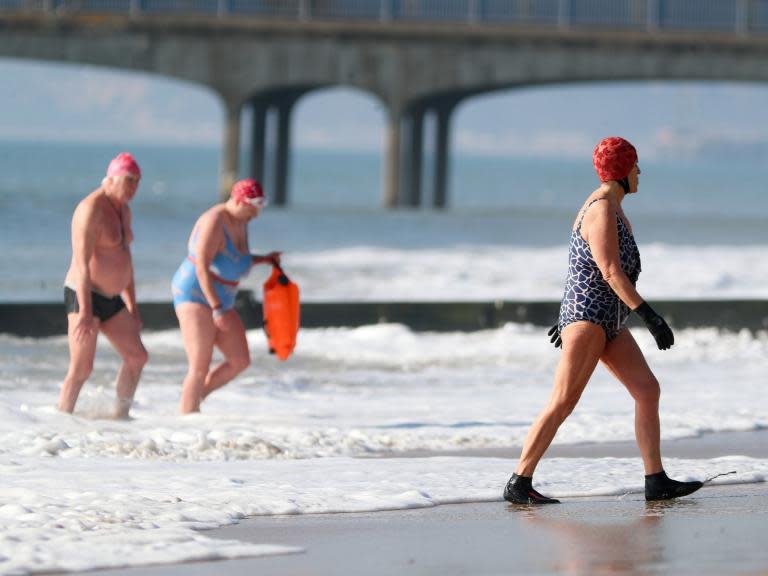What is the impact of hot winter weather and is climate change playing a role?
Hedgehogs could struggle for food, frog spawn could be lost to frost and birds could suffer if they migrate early, experts have warned as the UK is experiences the highest winter temperatures since records began over a hundred years ago.
A temperature of 21.2C was recorded at Kew Gardens in London on Tuesday, beating the 20.6C measured at Trawsgoed, near Aberystwyth the day before.
The soaring temperatures have been described as “an extreme weather event” by the Met Office and come at the end of a particularly mild winter.
Met Office spokesman Grahame Madge told The Independent: “To see temperatures of over 20 on a winter’s day is exceptional. The previous record was 19.7 and that’s stood since 1998. It is a rare event to see temperatures this high in February."
While February is now “within striking distance” of becoming the warmest February since records began, December was also two degrees warmer than average overall, with high temperatures early in the month reaching over 15C.
[[gallery-0]]
Meanwhile, 27 councils across the country have declared a “climate emergency” in an effort to force authorities to act against climate change.
Later this week the heat is expected to drop somewhat as an Atlantic weather system brings strong wind and rain.
The effects of the unseasonably warm weather are felt particularly keenly at this time of year by hibernating animals, who may emerge earlier and find there is not enough food to sustain them, and that the weather may turn cold again.
“It is mammals who will suffer worst,” Ben Keywood, an entomologist at Sheffield & Rotherham Wildlife Trust told The Independent. “If hedgehogs have started coming out over the last two weeks or so, they are going struggle to find a lot of the food they would normally eat as a lot of it is not out yet. So then [when the temperature falls] they may not have had enough to eat when they go back into hibernation and will have used up more of their fat reserves, which can make them significantly weaker.
“Frogs could also start to spawn, and that wouldn’t normally happen until March or April, if they spawn and then there is a frost, then it could kill all the spawn, which would be disastrous.”
The concern, he said, was that if climate change makes this a more regular occurrence and this keeps happening “then it could start having very severe effects on species because it can weaken them and change their behavioural patterns”.
He added: “Lots of species time their emergence - particularly birds - so it coincides with the food they need is at its most plentiful,” he said. “So if that starts early then they are out of sync with their food source. It could help species such as owls and birds of prey, as [species like dormice and harvest mice] will be more visible, and could be weaker.”
“It’s all about upsetting the balance - none of this is normal. While nature can and will adapt to seasonal fluctuations, it does send things off kilter and can be dangerous if it keeps happening.”
The warm weather have also seen migrating birds such as swallows and house martins return to the UK earlier than normal.
Martin Harper, the RSPB’s director of global conservation, said: “While the warm weather, bright sunshine and abundant sights and sounds of nature undoubtedly make us all feel better, they should also ring alarm bells. The early signs of spring are likely down to climate change, which is bad news for us all.
“As we expect the weather to return to temperatures more traditionally associated with this time of year - as they are forecast to - then there could be a real crisis for our birds, insects and other wildlife.”
Although scientists warn against conflating specific weather events with climate change, there is wide recognition extreme weather becomes more likely as the baseline for average temperatures has risen.
Dr John Shonk, a scientist at Reading University’s meteorology department, said climate change means the likelihood of hot extremes is increasing.
He told The Independent: “Climate is all about long-term trends, you can’t necessarily attribute one extremely warm event to climate change, because weather changes week to week. Around about this time last year we were suffering from the effects of the Beast from the East when it was really cold. To attribute a single weather event to climate change - you can’t really do that.
“But then again the climate is warming, and when it comes to extremes, you are looking at how the likelihood of those extremes might change. Yesterday we had the first winter temperature past 20C in the UK and that’s the first time that’s happened. In the future climate, as the system warms, there’s an increasing chance we will see that more.”
“Given the climate is warming we’re more likely to get warmer extremes occurring than colder extremes.”
This was echoed by Bob Ward of the Grantham Research Institute on Climate Change and the Environment at LSE. He said: “Today’s record for the UK’s winter temperature is consistent with the clear climate change signal that we are seeing in the UK. Our climate is transforming towards warmer and wetter winters and hotter and drier summers. From 2000 onwards, the UK has experienced its 10 warmest years on record and six of its seven wettest years.
“While warmer winters might seem pleasant for many people, it is worth remembering that this is the result of a climate change trend that is also making heatwaves and heavy rainfall more frequent, as well as coastal flooding due to sea level rise. Last summer was the hottest on record in England and, according to the Office for National Statistics, the heatwave conditions were linked to hundreds of additional deaths across the UK.”

 Yahoo News
Yahoo News 

